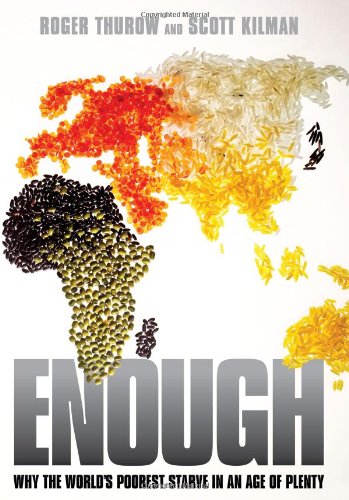Every day more than 25,000 people die from hunger and malnutrition related diseases. That is the equivalent of sixty 747’s crashing everyday. Two-thirds of those who die from hunger-related causes are children.
Roger Thurow and Scott Kilman, both correspondents for the Wall Street Journal, teamed up to write Enough: Why the World’s Poorest Starve in an Age of Plenty. Thurow and Kilman point out that the causes of hunger are multiple and complex. However, the inability to provide a sufficient food supply is not one of them. With all of the technological advancements in agriculture over the past forty years, the capability exists to provide enough food to more than adequately nourish every person on the planet. However the reality is that the number of hungry and malnourished people is increasing.
Causes for world hunger include increased prosperity in countries like China and India which has escalated the demand for grain-fed meat and dairy products. Another cause is the increasing amount of grain that is being used for biofuel. In the US, 30% of the nation’s corn crop goes to bio-fuel–about double that of 2006. Because of this, grain reserves have plummeted causing the price of many staple foods to double between 2006 and 2008. Corrupt governments have also misused aid and used starvation as a weapon of war.
The aid and trade policies of western governments have sometimes served as an impediment to reducing world hunger. In 2003, the US provided Ethiopia with more than $500 million in American grown grain to feed the hungry, but they provided only $5 million, one percent of that total, in agricultural development aid which helps prevent the people from going hungry in the first place. Since the 1940’s Congress has mandated that the vast majority of US food aid must be food grown in the US, and three-fourths of the aid must be shipped on US flag carriers. While this has benefitted US farmers and shippers, this practice has been neither efficient nor effective. Providing aid by purchasing food locally stimulates the local economies, helps local farmers, takes less time, and is cheaper. Highly subsidized imported food products from the west have hurt local economies and have put local farmers out of business in many developing countries, particularly in Africa. While the amount of aid has been increasing, the losses in trade incurred due to the subsidies from the West have negated the effect of much of that aid. As an example, in the year 2001 western governments provided $52 billion in aid to the worlds’ poorest countries. However a UN report noted that the impact of subsidies from the west in 2001 cost the poorest countries an estimated $50 billion dollars in export revenues.
Thurow and Kilman wrote Enough to stir individuals, organizations and governments to action in ways that will bring about a world where there is enough food for all. Enough is a must read for anyone who wishes to see this dream become a reality.




This is a great book… chapter 9 has a couple great stories of how people lifting their voices and advocating for change can make big impacts to, through groups like Bread for the World, et al.
Report This Comment
08.25.10 at 3:54 pm
Adam, thanks for the reply. The book strongly affirms the work of Bread as well as a Foods Resource Bank. CWR has close ties to both.
Report This Comment
08.27.10 at 12:38 pm
Thanks Dave. I must get the book.We have finished one more group using THE HOLE IN OUR GOSPEL. Slowly people are catching the vision.
Report This Comment
08.27.10 at 10:37 pm
Diane, Here is the link on Amazon http://www.amazon.com/Enough-Worlds-Poorest-Starve-Plenty/dp/1586485113
Report This Comment
08.31.10 at 10:51 am